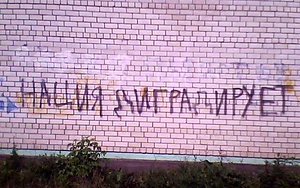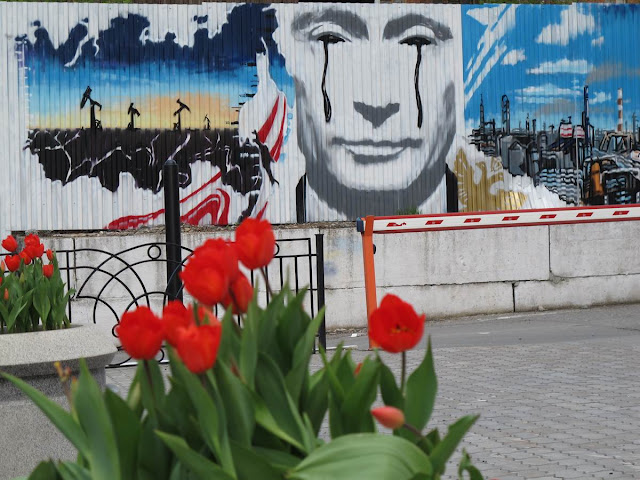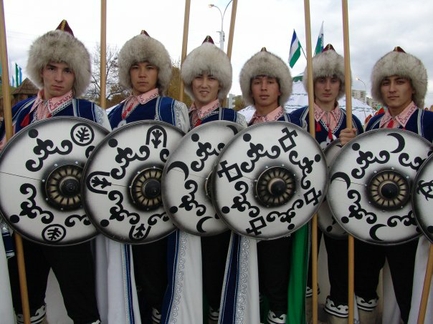“Post-Soviet Russian nationalism has been fatally flawed from the outset because it arose not from the word ‘nation’ but from the word ‘nationality,’” a reflection of the fact that a Russian “nation” in the normal of sense that term does not yet exist in Russia, according to Vadim Shtepa.
In a commentary on Delfi.lt, the Russian philosopher and regionalist notes that the invocation of the term “Russian world” to “justify territorial expansion and annexation of the regions of other countries” has led ever more people to discuss Russian nationalism and to ask whether a Russian nation exists.
That is at the heart of discussions about the similarities and differences between “an ethnic Russian [“russkaya”] nation and a non-ethnic [“rossisskaya”] one, he says.
One must not confuse a nation with an ethnos, Shtepa continues. The latter is “a biological phenomenon while the nation is a social-civil one.” For example, Americans arose as a separate nation even though at their start they were part of the same ethnos as the empire from which they separated.
“In other words,” he continues, “a nation is a social contract which presupposes the presence of a civil society. From this point of view, no nation has arisen in Russia in the course of its history.” There were precursors of one in the Novgorod Republic but that was destroyed by Moscow, and the centralized Muscovite state transformed the entire population into “subjects,” not citizens.
In Soviet times, “despite all solemnly proclaimed equality of citizens, in fact, the residents of the USSR remained slaves of the state, the interests of which immeasurably exceeded the status of any individual citizen.” Indeed, Shtepa notes, in the USSR, the word “citizen” had almost a “criminal” connotation. “’Comrade’” was preferred.
But even after the collapse of the USSR, “a nation as a civic phenomenon did not arise.” Few accepted the identity of “’Rossiyane,’” viewing it as “only the continuation of the faceless ‘Soviet people’” and thus confusing a nation with the “ethnic ‘nationality’ which was fixed in Soviet passports.”
With the new rise of “neo-imperial attitudes and the appearance of the doctrine of ‘the Russian world,’” the government media has been able to create only “a quasi-nation,” insisting that it consists of “all the subjects of the empire” or all those who speak Russian. But that does not have anything in common with a real nation, Shtepa argues.
A genuine Russian civic nation can arise “only if Russia becomes a full-fledged federation, the subjects of which will have a high level of self-administration and at the same time have an interest in the development of inter-regional ties.” But Russia in fact has been “converted into a unitary state where the regions have been reduced to provinces without rights.”
That is generating opposition in the regions rather than quieting it, and “separatist attitudes are inevitably arising.” Indeed, Shtepa says, “new civic nations are arising already in the post-Soviet regions” of the Russian Federation, a development which he calls “entirely logical.”
To the extent that “present-day Russia ever more applies to itself the religious-messianic title of ‘the Third Rome,’ it can count on a similar end to ‘the First,’ when out of imperial Romans arose Italians, Spaniards, French, and so on.”
Shtepa points out, however, that “the distorted understanding of the nation” which Russians are now displaying is shared by many non-Russians who also conflate nation and nationality and thus promote ethnocratic regimes, which he defines as those which seek to give privileges to “‘the titular ethnos.’”
Neither understands that “the contemporary nation is inclusive: it can include within itself representatives of many ethnoses” and that its “chief characteristic is civic patriotism and work for the good of one’s own republic.” As Shtepa notes, the Finns have a real nation not an imaginary one: As a result, they could have as their founding father “Marshal Mannerheim, a Swedish baron and Russian general who initially could barely speak Finnish.”
People in Russia “frequently like to criticize the Baltic republics for ‘discrimination’ against Russian speakers,” but they typically get their facts wrong. In Lithuania, all permanent residents who wanted citizenship received it “regardless of their ethnic origin.”
“In Latvia and Estonia, the situation was more complicated,” Shtepa says, “but even there to obtain citizenship it was sufficient to pass an easy examination on knowledge of the state language and the Constitution. And today, the mayor of Riga is an ethnic Russian” – but there is “no doubt” that he is a member of “the Latvian civic nation.”
Moreover, the Russian regionalist points out, “Latvian ‘non-citizens’ in a paradoxical way turn out to be almost the most privileged social group” in that country because they enjoy “the unique right” of visa-free travel to Russia and the EU, even though they show little interest in resettling in Russia.
Ukraine “after the revolution last year can really serve as an example of the establishment of a new civic nation,” one in which identification and not language or ethnicity is the key. Unfortunately, at present, “it is impossible to imagine an analogous” development in the Russian Federation.
In conclusion, Shtepa suggests that “a healthy nation which recognizes its own civil rights and is prepared to defend them doesn’t need any push toward nationalist passions.” That was shown by the march in Paris for freedom of speech. Unfortunately, too, the Kremlin has been backing those in the French National Front who didn’t take part.
Clearly, he says, “the chauvinists of various countries are finding a common language.” The question for the future is whether citizens will do the same.







